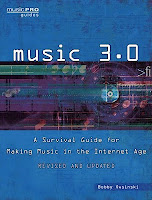This time it's an excerpt from an interview with my good friend Thom Kozik, who knows more about gaming (and tech in general) than most people on the planet. Thom began in digital media in 1990 while at Microsoft where he helped engineer the beginning of both the multimedia revolution and interactive television. Along the way he's spent most of his time on the gaming side of the tech industry, having served as president of gaming search engines Wazap and All-Seeing Eye (which he sold to Yahoo in 2004), before he became director of business development for Yahoo’s Media group, then Executive Vice President of Online Gaming at Atari. He is now president of Nüko Games.
In this excerpt, Thom talks about how games are evolving and how that's providing opportunities for artists and composers like never before.
---------------------
"There are two big things that have changed; the explosion of online gaming in the Western markets (predominantly driven through Facebook), and the music games that we were talking about two years ago have sunsetted with the change in appetite among gamers.
As far as console games like Rock Band and Guitar Hero, there’s a feeling by video game publishers that they’ve milked that cow as far as they could and can no longer sell tracks endlessly into those franchises. They haven’t turned them off completely and there’s still an effort to continue to sell into their installed base, but we’re not going to see another Beatle’s Rock Band on the horizon. The economics just aren’t there.
For an artist who wants to produce for this space, I think there’s actually more opportunity than there was a couple of years ago. Back then the focus was on the music games, but the publishers really didn’t worry about new music at all. They just wanted old back catalog to throw into the channel.
Now browser-based and mobile gaming (which I still consider to be online gaming) is where the action is. The truth is that the biggest growth area is based around games that depend upon and live via an online connection. In mobile games in particular, most of the early games in this area were self-contained experiences where titles like Angry Birds and Doodle Jump had the audio assets for the entire experience, along with all other elements, in the download package that the consumer purchased from an App Store. That’s shifting quickly to games like Infinity Blade, which uses a traditional console gaming engine and has taken the iPhone and iPad markets by storm. No one expected to see a game of this breadth and quality on a mobile device. It wasn’t because of the limitation of the device, but more about the nature of the product being released by the game developers. What’s most important about a game like Infinity Blade and those that are going to follow is that they’re structurally more like console games in that different levels load dynamically as the player progresses. What’s important for musicians is that there’s a need for more soundtracks and audio assets as the publishers continue to sell and ship those new levels to players. This trend in mobile gaming is much bigger than the equivalent of “map packs” that publishers put out for console and PC games in years past.
From a creative standpoint, now you have a few leading indicators of what can really be done on these mobile platforms. We’re opening up a really cool opportunity for the composer, artist or publisher to do the same kind of grand scoring and creative expression of music on a mobile device that they would have done on a console as recently as a couple of years ago. That’s a big opportunity.
On the browser game side, one of the things that we’re going to see is that the game developers and studios have had their eyes opened to what can be done in a web browser, so the games are getting much bigger in scope. What’s important is that in the Angry Birds or Doodle Jump world, the ability to create a score or the amount of music available in the game is fairly limited. Contrast that to the kind of games we’re used to seeing on consoles or PCs or massive multiplayer games like World Of Warcraft. The music is epic -- it’s a lot more than some catchy loops.
It’s soon going to be easier to have great epic scores on mobile games than on the browser because of the nature of the way that a browser talks to the Internet. There is technology out there that can make this easier, but it will be a question of how smart the game developers are with this."
For more book excerpts from this book and others, go to my website.
-----------------------------------
Help support this blog. Any purchases made through our Amazon links help support this website with no cost to you.
You should follow me on Twitter for daily news and updates on production and the music business.
Check out my Big Picture blog for discussion on common music, engineering and production tips and tricks.


No comments:
Post a Comment